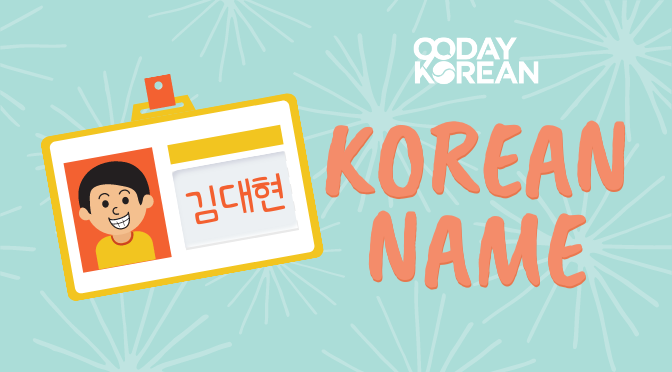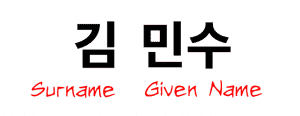In this article, you will learn all about Korean names.
Knowing someone’s name is important to properly address the person. But it’s more than just that in the Korean culture.

Listed below are the different Korean last names and first names. We’ve also added the meaning of some of these names to help you have a better grasp of Korean names. Let’s get started!
List of Korean Names
Below are lists of common South Korean family names and Korean first names.
List of Korean last names
Here is a list of the top Korean last names in both English and Hangul, along with their meaning.
| Korean Family Name | Hangul | Meaning |
|---|---|---|
| Kim | 김 | Meaning: Metal, gold or iron |
| Lee | 이 | Meaning: Plum tree |
| Park/Bak | 박 | Meaning: Gourd |
| Gwan | 관 | Meaning: Tube or pipe |
| Jeong | 정 | Meaning: Tablet or quiet |
| Yang | 양 | Meaning: Amount or positive |
| An | 안 | Meaning: Within |
| Jin | 진 | Meaning: Camp lost or a sign of the dragon |
| Yoo | 유 | Meaning: Willow tree |
| Han | 한 | Meaning: The One |
| Nam | 남 | Meaning: A Man or south |
| Cho | 조 | Meaning: Second or beginning |
| Yun | 윤 | Meaning: Cloud or luck |
| Pae | 배 | Meaning: Loosely or The name of the 'Pae' clan |
| Ma | 마 | Meaning: Horse, hemp |
List of Korean first names
Below are the top Korean first names in English and Hangul. It also includes the meanings of these native Korean words.
| Name | Hangul | Gender | Meaning |
|---|---|---|---|
| Ara | 아라 | Female | Meaning: Beautiful |
| Areum | 아름 | Female | Meaning: Beautiful |
| AYeong | 아영 | Female | Meaning: Refined |
| BoBae | 보배 | Female | Meaning: Treasure, precious |
| Bom | 봄 | Female | Meaning: Spring |
| BoRa | 보라 | Female | Meaning: Purple color |
| Byeol | 별 | Female | Meaning: Star |
| ChoHee | 초희 | Female | Meaning: Beautiful, joy |
| Daehyun | 대현 | Male | Meaning: Wise man |
| DaeSeong | 대성 | Male | Meaning: Great success |
| DaEun | 다은 | Female | Meaning: Young girl or Silver |
| DaJeoung | 다정 | Female | Meaning: Loving and understanding |
| DoHyun | 도현 | Male or Female | Meaning: An intelligent person |
| Donghyun | 동현 | Male | Meaning: A symbol of strength. |
| DoYoon | 도윤 | Male | Meaning: A government post |
| DoYun | 도연 | Female | Meaning: Lotus blossom |
| Eun Ae | 은애 | Female | Meaning: Grace and love |
| EunHee | 은희 | Female | Meaning: Wish |
| EunHye | 은혜 | Female | Meaning: Grace |
| EunJeong | 은정 | Female | Meaning: Warmth |
| EunJi | 은지 | Female | Meaning: Wisdom or mercy |
| Eunsuh | 은서 | Female | Meaning: Mercy or west |
| EunYoung | 은영 | Female | Meaning: Talent |
| GaHee | 가희 | Female | Meaning: Beauty or elegance |
| Hana | 하나 | Female | Meaning: One |
| Haru | 하루 | Female | Meaning: Spring |
| HaYoon | 하윤 | Male or Female | Meaning: Morality or richness |
| HeeJin | 희진 | Female | Meaning: Honest |
| HyeJin | 혜진 | Female | Meaning: Bright |
| HyeonJeong | 현정 | Female | Meaning: Virtuous or worthy |
| HyeonJu | 현주 | Female | Meaning: Jewel or pearl |
| HyeonU | 현우 | Male | Meaning: Manifest or clear |
| HyunYoung | 현영 | Female | Meaning: Able |
| Iseul | 이슬 | Female | Meaning: Dew |
| Jaehyun | 재현 | Male | Meaning: Wisdom |
| JangMi | 장미 | Female | Meaning: Rose |
| Jeong | 정 | Male or Female | Meaning: Gentle |
| JeongHui | 정희 | Male or Female | Meaning: Right or beauty |
| Jia | 지아 | Female | Meaning: Clear or good |
| JiEun | 지은 | Female | Meaning: Branch or kindness |
| JiHo | 지호 | Male | Meaning: Brave spirit |
| JiHoo | 지후 | Male or Female | Meaning: Wisdom or elegant |
| JiHye | 지혜 | Female | Meaning: Intelligent |
| JiMin | 지민 | Male or Female | Meaning: Gentle or jade |
| Jin | 진 | Male or Female | Meaning: Jewel or truth |
| JinHwa | 진화 | Female,Male | Meaning: Most wealthy |
| JinSol | 진솔 | Female | Meaning: Become a leader |
| JiSoo | 지수 | Male or Female | Meaning: Gorgeous |
| JiU | 지우 | Male or Female | Meaning: Ambition or universe |
| JiWon | 지원 | Male or Female | Meaning: First beautiful woman |
| JiYoung | 지영 | Male or Female | Meaning: Honor |
| Jiyun | 지윤 | Female | Meaning: Glossy |
| JooEun | 주은 | Female | Meaning: Silver pearl |
| JooMi | 주미 | Female | Meaning: Pretty |
| Joon | 준 | Male | Meaning: Strict |
| JooYeon | 주연 | Female | Meaning: Gentle or relaxed |
| JunA | 준아 | Female | Meaning: Swift horse |
| JunHo | 준호 | Male | Meaning: Summer sky |
| Junwoo | 준우 | Male | Meaning: Handsome |
| KiPpeum | 기쁨 | Female | Meaning: Joyful |
| KyungHee | 경희 | Female | Meaning: Hope |
| MiHee | 미희 | Female | Meaning: Beautiful or joy |
| Min | 민 | Male or Female | Meaning: Jade |
| Minho | 민호 | Male | Meaning: Fall sky |
| MinJi | 민지 | Female | Meaning: Sharp or comprehend |
| MinSeo | 민서 | Female | Meaning: Composed or People |
| Nari | 나리 | Female | Meaning: Lily |
| SaeRom | 새롬 | Female | Meaning: Bamboo |
| SangHoon | 상훈 | Male | Meaning: Eternal or teach |
| Sena | 세나 | Female | Meaning: Neatly |
| SeoHyeon | 서현 | Female | Meaning: Felicitous omen or worthy |
| SeoJoon | 서준 | Male | Meaning: Slowly |
| Seok | 석 | Male | Meaning: Tin |
| Seol | 설 | Female | Meaning: Snow |
| SeoYeon | 서연 | Female | Meaning: Make clear |
| Seunghyun | 승현 | Male or Female | Meaning: Succession |
| Shin | 신 | Male | Meaning: Center or belief |
| SiWoo | 시우 | Male | Meaning: Honest |
| SoHee | 소희 | Female | Meaning: Young or honest |
| Soo A | 수아 | Female | Meaning: Talent or lofty |
| Soobin | 수빈 | Male or Female | Meaning: Sparkle |
| SooHo | 수호 | Male | Meaning: Guardian |
| SooJin | 수진 | Male or Female | Meaning: Truth |
| Soomin | 수민 | Male or Female | Meaning: Smart |
| SooYeon | 수연 | Female | Meaning: Lotus flower or lovely |
| SungMin | 성민 | Male or Female | Meaning: Star or clever |
| Taeyeon | 태연 | Female | Meaning: Proud or big |
| Wook | 욱 | Male | Meaning: Dawn or rising sun |
| YeEun | 예은 | Female | Meaning: Rainbow |
| YeJi | 예지 | Female | Meaning: Study or Beautiful |
| YeJoon | 예준 | Male | Meaning: Trout or humble |
| YeonAh | 연아 | Female | Meaning: Beauty or better |
| Yeong | 영 | Male or Female | Meaning: Flower |
| YeRim | 예림 | Female | Meaning: Azure |
| YooJin | 유진 | Female | Meaning: Generous |
| Yoon | 윤 | Female | Meaning: Shine |
| YoonAh | 윤아 | Female | Meaning: Highly beauty |
| YuMi | 유미 | Female | Meaning: Willow or beauty |
| YunSeo | 윤서 | Female | Meaning: Allow or lazy |
| Yuri | 유리 | Female | Meaning: Comfortable or glass bead |
All About Korean Names
What’s in a name? Well, in Korea — a name can mean quite a bit actually!
Many South Korean parents will spend a lot of time and money to come up with the perfect name for their child. It’s not just about choosing a name in Korean that will make their child popular. They believe that names can determine their destiny.
Almost all names in Korean have a deeper meaning through Hanja characters (Chinese characters). These names are called Sino-Korean, but more on that later.

With a child’s future on the line, it’s important to come up with a good name in Korean. The family doesn’t necessarily choose a name because it’s popular, but will often choose one that means something in Korean.
How do South Korean Names Work?
You may have seen South Korean names before. Maybe you have a favorite K-pop star, K-drama character, Korean movie character, or Korean athlete. Do any of these popular Korean individuals ring a bell?
Kim Yuna (김연아)
Lee Hyo-ri(이효리)
Lee Min-ho (이민호)
Bae Yong-joon (배용준)
As you can see, most names in Korean have three syllables.
There are some names with more than three syllables and some names with less than three syllables. However, the large majority of names have three.
You should try to stick with a three-syllable name as well when coming up with a name in Korean for yourself. It’ll make it much easier for your Korean friends and acquaintances that way.
The second part is the given name. The name above is 김 민수 (Kim Min-su).
Korean Name Structure
Korean names usually consist of three phonetic units or syllables. They’re made up of the last name and the first name with two syllables. Let’s look at an example name:
김민수
- 김 is the first unit, and also the person’s family name. It’s written first.
- 민수 takes the second and third unit places and is the person’s given name. It can be written on its own or after the family name.
Korean First Names
Although the first names (given name) of Koreans are typically two phonetic units, it is possible to have one-syllable names in Korean. For example, you may see one-syllable names like 박 (Park) and three-syllable names, like 빛나리 (Bit-nari). These are infrequent in South Korea though.
Here are some examples.
One-Syllable First Name
- First name: 준
- Last name + first name: 김준
Three-Syllable First Name
- First name: 빛이찬
- Last name + first name: 김빛이찬
There will be many different Korean first name combinations. Although some will be more common than others, you’ll constantly run into new ones you’ve never heard of!
Korean Last Names
South Korean last names usually have a single syllable. However, sometimes there are two-syllable last names, but they are rare. Some examples are 사공 (Sa-gong) and 남궁 (Nam-gung)
In the culture in South Korea, it’s proper for the Korean family name to be written first. So the first character you see is the family name. There are about 250 last names in South Korea. The most common Korean surnames 김 (Kim), 최 (Choi), 이 (Lee), 박 (Park) make up over half of all last names in Korea
Some other common South Korean last names are 김, 박, 정, 윤, 문, 이, 최, and 강.
Korean Name Traditions
In South Korean culture, the same name (Korean given name) is usually not passed down from generation to generation (i.e. from father to son, mother to daughter). However, it’s possible and quite common for South Korean parents or a South Korean family to have a generational name.
Basically, a generational name syllable means a single Korean character with an individually distinct syllable (Hangul or Hanja characters) is shared within the family. Although this isn’t practiced as much in modern Korean names.
For example, it’s popular for parents in South Korea to name their kids with the same first syllable if the genders are the same, i.e. 지우 (Ji-woo) and 지훈 (Ji-hoon), 유진 (Yu-jin) and 유림 (Yu-rim)
Korean Hanja Names
Almost all names have a Hanja spelling. Hanja is the word used to describe a Chinese character in Korean and is an important part of the language. You can see this in Sino-Korean names such as Eun (은 | 恩 = kind) or Hyeon (현 | 賢 = virtuous).
Hanja adds an additional aspect to the meaning behind a name in Korean.
How to Pronounce Korean Names
If you’re not used to pronouncing Korean names it’s best to brush up on that before diving in with a name of your own! And that means learning to read the Korean alphabet. It takes about 1 hour and you will be able to pronounce names in Korean correctly.
You can also estimate their pronunciation by writing them out in English. The next section below will show you how to change South Korean names to English letters.
How to Write Korean Names in English
If you need to convert a name from Hangeul to English letters, your best bet is to follow the standard Romanization of the Korean System. If you use these rules, you’ll reduce your chances of confusion.
Consonant Characters
Below are the consonants included in the Korean alphabet:
| Hangeul | Romanized (First) | Romanized (Final) |
|---|---|---|
| ㄱ | g | k |
| ㄲ | kk | k |
| ㄴ | n | n |
| ㄷ | d | t |
| ㄸ | tt | – |
| ㄹ | r | l |
| ㅁ | m | m |
| ㅂ | b | p |
| ㅃ | pp | – |
| ㅅ | s | t |
| ㅆ | ss | t |
| ㅇ | - | ng |
| ㅈ | j | t |
| ㅉ | jj | – |
| ㅊ | ch | t |
| ㅋ | k | k |
| ㅌ | t | t |
| ㅍ | p | p |
| ㅎ | h | t |
Vowel Characters
Here is the complete list of Korean vowels:
| English | 한국어 (Korean) |
|---|---|
| ㅏ | a |
| ㅐ | ae |
| ㅑ | ya |
| ㅒ | yae |
| ㅓ | eo |
| ㅔ | e |
| ㅕ | yeo |
| ㅖ | ye |
| ㅗ | o |
| ㅘ | wa |
| ㅙ | wae |
| ㅚ | oe |
| ㅛ | yo |
| ㅜ | u |
| ㅝ | wo |
| ㅞ | we |
| ㅟ | wi |
| ㅠ | yu |
| ㅡ | eu |
| ㅢ | ui |
| ㅣ | i |
Let’s Romanize the name “윤민지” using the rules above.
윤 = Yun
민 = Min
지 = Ji
Put them together and you’ve got “Yun MinJi”.
You will definitely see variations on how Korean names are spelled in Romanized Korean, but that’s how it’s done according to the Romanization rules.
Why Korean Names in English Are Confusing
Let’s say you see a name in South Korean written in Romanized Korean that looks like this:
JaeHun
Does this mean 재훈 (JaeHoon) or 재헌 (JaeHeon)?
This is a common problem that most South Korean learners face with writing names in South Korean using English letters. Koreans will use various combinations of English letters to spell their names in English depending on their personal preferences, so it’s hard to know how to pronounce their name in Korean until you ask or you make a mistake trying it.
Therefore, it’s easier and more precise to use Hangeul!
The post Korean Names – List of Common First and Surnames appeared first on 90 Day Korean®.
 Learn to read Korean and be having simple conversations, taking taxis and ordering in Korean within a week with our FREE Hangeul Hacks series: http://www.90DayKorean.com/learn
Learn to read Korean and be having simple conversations, taking taxis and ordering in Korean within a week with our FREE Hangeul Hacks series: http://www.90DayKorean.com/learn
Korean lessons * Korean Phrases * Korean Vocabulary * Learn Korean * Learn Korean alphabet * Learn Korean fast * Motivation * Study Korean



Recent comments